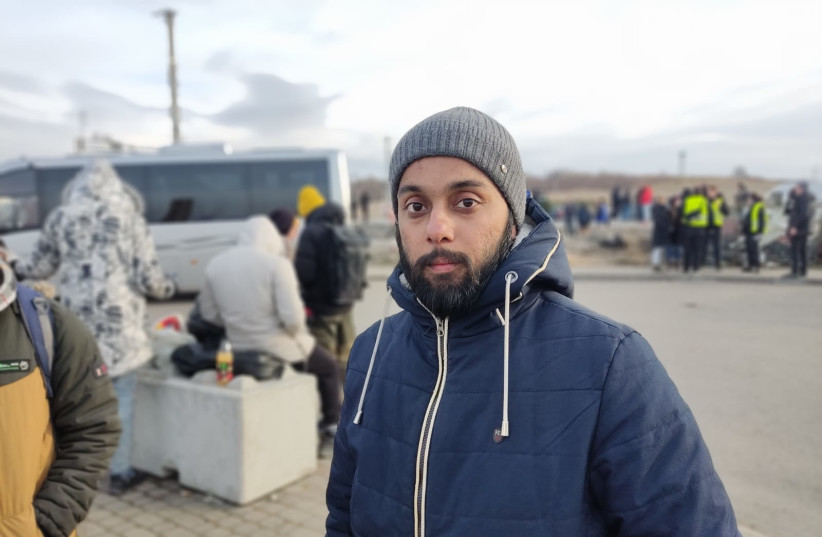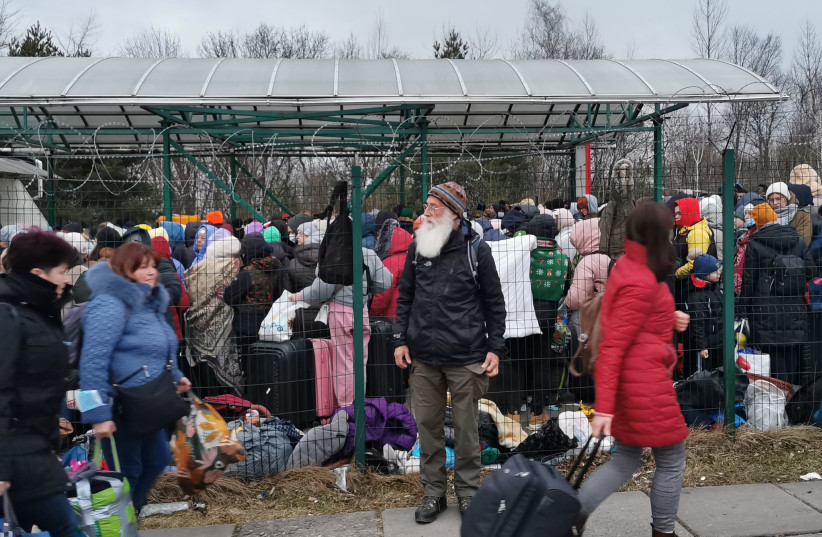WARSAW – An elderly Ukrainian woman looked lost at Warsaw Airport just a few days ago. She tried to call an international number but wasn’t able to get through. One of the Jewish Agency’s senior executives was at the airport assisting Jewish refugees aboard a flight to Israel, and noticed this woman who was not part of the group.
“Do you need any help?” asked Roman Polonsky, head of the Unit for Russian Speaking Jews.
“I’m trying to dial this number that starts with +972,” she answered in despair.
“She was a refugee from Ukraine who went through hell till she was able to leave the country, and now she was stuck since she only had $200 and she needed $500 in order to buy a plane ticket to Israel,” said Polonsky. “She prayed and said ‘Please God, send me help; please grant me just one miracle.’”
Polonsky was her miracle. It turns out that she is entitled to immigrate to Israel, and therefore does not need to pay for her flight. She left to a hotel where Agency staff are stationed, and began filling out her paperwork.

“The best thing is that her name is Esther, and I hope she’ll be able to celebrate Purim in Israel,” said Polonsky, and for the first time in the many hours this reporter has been traveling with him, he smiled, even though he was overwhelmed and very tired, as are so many of his colleagues.
A special delegation of the Jewish Federations of North America (JFNA) visited the Jewish refugee camps and centers across Poland, as well as the Medyka border connecting Ukraine and Poland.
More than two weeks ago, the situation here was very messy. There was no organization, and all of the aid and assistance was minimal. Fast forward 15 days, and the many centers across the country are working beautifully. There are lots more staff in different locations, food is being distributed, and many refugee centers are being operated by the Polish government, Jewish organizations, international human rights nonprofits and foreign countries.

The first stop on Tuesday was at the refugee center in Lublin. What used to be the largest and one of the most significant yeshivas before the Holocaust, Yeshivat Chachmei Lublin, has become a refugee center for about 25 families, most of whom come from a Jewish background. The yeshiva is owned by the Polish Jewish community and is now a hotel. The Beit Midrash, the learning and prayer hall, still exists, and JFNA CEO Eric Fingerhut led a minyan for morning prayers.
The Jewish refugees of 2022 are well taken care of, and are in a totally different situation than were the refugees after the Holocaust. The lunchroom is filled with fresh bread, baked goods, fruits, vegetables and even fruit shakes.
One of the families at the hotel-turned-refugee camp is the Shabbas family of Kyiv. Even with such a Jewish-sounding name, they are Christian. Yelena Shabbas, a chemist, left Kyiv with her mother and sister, leaving behind her husband, brother and father.
“I want to say that Polish people and the Polish Jewish community are incredible,” she said while surrounded by American Jews. “Thank you for your support and your help. I feel deep down inside that your kindness is truthful,” Shabbas said, wiping a tear from her eye. “If someday any Polish or Jewish person will need support or help, I will be the first to help.”
Asked if they have a Jewish connection, Shabbas answered, “We are Christians, but after the war is over we decided to check our roots and see if we are Jewish,” and her audience laughed fondly.
On a long ride to the Polish-Ukrainian border, Polonsky revealed the new strategy of the Jewish Agency for speeding up the process of immigrating to Israel.
“The pre-aliyah interviews usually take between 40 minutes to an hour if they have all of their paperwork and if all goes well,” Polonsky said. “We now have substantially cut down the time of the interviews in what we call the ‘Go-No Go’ system. Now most interviews of families are about five minutes, and therefore we are able to go through many more applicants in a day. The idea is that if the refugees have a connection to Israeli citizens, we approve their flights to Israel, and then they continue the process while in Israel instead of in Poland or other countries.
“We already see the results. More people can now apply for aliyah. It gives us the opportunity to accommodate more people in our refugee centers since they make aliyah and then make their rooms available to new refugees.”
Polonsky said that the ‘Go-No Go’ is eight times faster than the regular immigration process.
The border of Medyka has changed tremendously since the beginning of the war. Two weeks ago there were barely any tents, the largest being of the Israeli organization Hatzalah without Borders. On Tuesday, there were tens of tents and thousands of volunteers from Poland and across the world feeding the refugees who passed the border after days of travel in difficult situations.
“I think that it was heartening to see the results of the very professional work of the organizations, that clearly the scale of the human tragedy is growing,” Fingerhut said at the end of the visit. “The capacity of the organizations and the governments to manage the crisis is growing. Certainly what we observed at the border was a humane situation: people were crossing and immediately being fed and clothed, children cared for. There were medical tents if people needed medicine. The scale of the response of the global community is significant. And I want to say with great pride, obviously, that the Jewish institutions are doing amazing work. The Jewish organizations were the first ones there, and we definitely gave an example to other nations and countries.”
